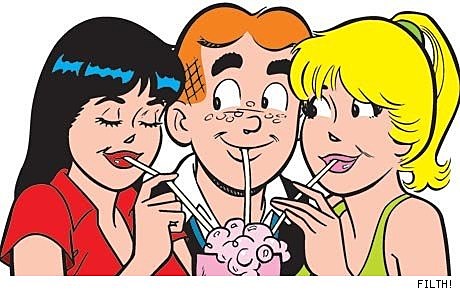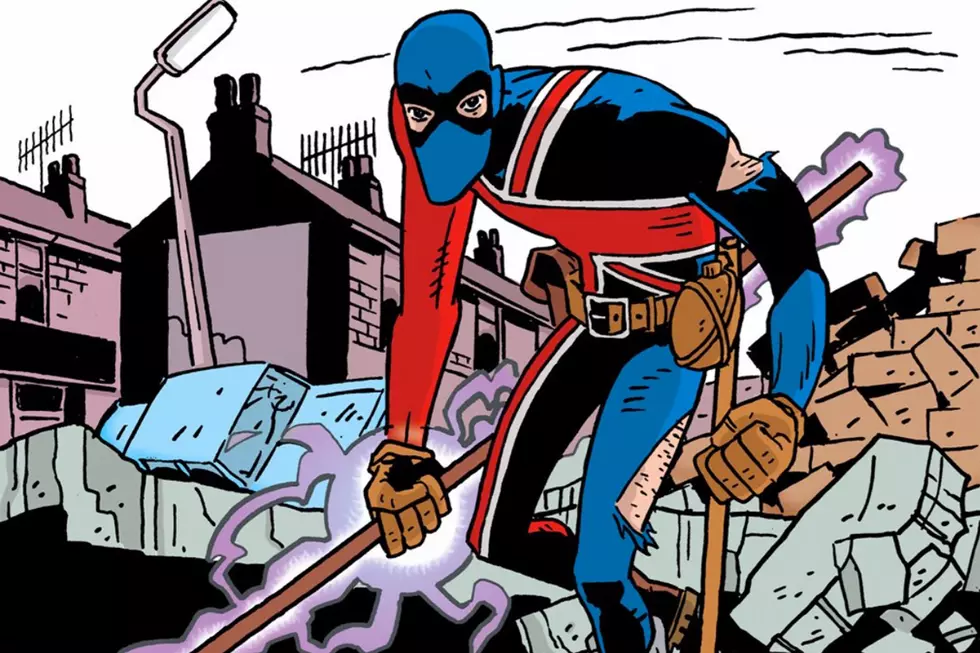
Ask Chris #46: What’s So Funny About Good Clean Fun?
Here at ComicsAlliance, we value our readership and are always open to what the masses of Internet readers have to say. That's every week, Senior Writer Chris Sims puts his comics culture knowledge to the test as he responds to your reader questions!

Before we get started with this week's round of questions, I'd like to announce a huge milestone for the Ask Chris column: Finally, after almost a year of doing this, I have my own theme song. It's a dancy little number courtesy of The Ampersands (alias Aaron of Awesomed By Comics), and if you're ready to get in the mood for some Q&A, you can listen to it right now!
 Q: What comics would you recommend for the prudish comic reader? Specifically, for someone who doesn't like to read anything with blood, gore, sexual content, or bad language. Just because I don't like offensive content doesn't mean I'm looking for kiddie comics-- I like something with a good, complex story. If you could help me find some comics that would match my tastes, I'd greatly appreciate it. -- Bert, via email
Q: What comics would you recommend for the prudish comic reader? Specifically, for someone who doesn't like to read anything with blood, gore, sexual content, or bad language. Just because I don't like offensive content doesn't mean I'm looking for kiddie comics-- I like something with a good, complex story. If you could help me find some comics that would match my tastes, I'd greatly appreciate it. -- Bert, via email
A: This has got to be one of the most complicated questions I've ever gotten, and I say that as someone who just last week spent a Thursday night juggling the variables of how the DC Universe matches up with the cast of My Little Pony. For starters, there's the obvious trouble: Trying to figure out what someone else thinks is "offensive content" is like trying to order dinner for someone you don't know, except it turns out they find certain vegetables to be morally reprehensible.I mean, I think it's pretty clear that we can go ahead and throw the entire collected works of Garth Ennis out the window on this one, and while that knocks out my usual go-to recommendations of Preacher, Hitman and Punisher, it doesn't really clarify just what qualifies as over the line. You say you don't like blood, but are we talking about just limiting it to comics that don't go for Evil Dead 2-esque fountains of the stuff being vomited by Red Lanterns (in which case, I'd tend to agree with you), or does even the presence of a Maxwell Lord Psychic Nosebleed knock a book like Justice League International out of the running?
The same goes for sex. I consider something like Jimmy Palmiotti, Justin Gray and Amanda Conner's run on Power Girl, which doesn't shy away from featuring an extremely busty heroine and a story about her being asked to repopulate an entire planet (which turns out to involve a giant space laser rather than any physical contact) to be a completely different use of sex in comics than, say, any given issue of Tarot: Witch of the Black Rose, but for you, they might both be too far. I mean, I've heard stories from retailer/blogger Mike Sterling about a customer who came to his shop and was scandalized by all the sex in Archie Comics.
Yeah. All the sex. In Archie Comics.

And as for language... Well, I'm a guy who managed to slip the phrase "bangable marmosets" into an article this week, so chances are, we're going to have completely different ideas of what is and isn't acceptable in polite company.

My second problem is the limit you set by rejecting "kiddie comics." I'm pretty sure I know what you mean -- you want something with a little more depth than Super Friends and Super Hero Squad -- but here's the thing. Most all-ages comics are classified that way specifically because they don't involve sex, violence, and swearing. And when you have creative teams that know how to work within those limitations, you can get some really great comics out of it.
 Case in point: Paul Tobin's current run as writer of the Marvel Adventures Spider-Man series. This is a book that is clearly for kids, but like the best things geared towards younger readers, it doesn't talk down to its audience, and ends up being something that actually lives up to being an all-ages book.
Case in point: Paul Tobin's current run as writer of the Marvel Adventures Spider-Man series. This is a book that is clearly for kids, but like the best things geared towards younger readers, it doesn't talk down to its audience, and ends up being something that actually lives up to being an all-ages book.
Tobin's stories -- which actually began in #53 of the previous volume of MA Spider-Man, and which are conveniently collected in volumes called Thwip!, Amazing and Spectacular -- are some of the best Spider-Man comics I've ever read, and coming at a time when the core Amazing Spider-Man title is better than it's been in 20 years, that's saying something. Each issue is a nicely done complete story, but there's an overarching plot involving a bounty placed on Spider-Man's head by a crime family, a romance with a new character named Chat, and even appearances by Chat's best friend, a teenage Emma Frost.
They're beautifully constructed comics, and despite the stigma associated with being a kid's book, they read less like something for kids and more like... well, like a really great story of Spider-Man as a teenager.
And it's hardly alone as far as sharp kids' books go. The Batman Adventures series by Kelly Puckett and Mike Parobeck that came out to tie in with Batman: The Animated Series was unquestionably the best Batman comic of the '90s. They were fun and clever, and while there was violence, it wasn't anything more graphic than you'd see on the show. Admittedly, there was one issue -- #3, with the Joker -- that scared the heck out of me when I was 10, that was less because of the off-panel violence than the outright creepiness of the Joker, which is as it should be. And the more recent iteration of the series from 2003, by Ty Templeton and Rick Burchett, is very much along the lines of Marvel Adventures Spider-Man.
And while we're on the subject of great comics geared at younger readers, there's one I'll recommend all day long: The Life and Times of Scrooge McDuck, by Don Rosa:

Life and Times, of course, is based on a Disney property, which means that it's about as far from offensive content as you're likely to find. Rosa even takes swipes at the increasingly grim-and-gritty world of super-hero comics in his notes for the collected edition, and I don't want to put words in the guy's mouth, but I came away with the idea that he was not a fan.
Like the original Carl Barks Uncle Scrooge stories that it's based on, Rosa's story, an ambitious tale designed to colect every throwaway line Barks ever wrote about Scrooge's past exploits and combine them into a chronicle of his rise to unimaginable wealth and his fall into the bitterness that reigns before he starts palling around with Donald and the Nephews, is pure adventure. It's meticulously researched both to fit into the references in the Barks stories (which are all listed in the notes) and for actual historical accuracy -- or as accurate as you can get with a talking duck that has three cubic acres of coins that he swims in like an otter. Either way, I have no qualms about recommending this one to anyone, as it's one of the best comics of all time.
Another one that often gets lumped in with kids' books -- and for good reason, even if it does have that elusive all-ages appeal -- is Jeff Smith's Bone.

Honestly, I can't imagine it's likely that you haven't heard of this one if you're asking a question to this column, but on the off chance that you haven't, it's good stuff. Over the course of sixty issues -- which I read when they were collected into the huge but reasonably priced One Volume edition -- Bone turns from a cartoony gag strip about Moby Dick and cow races into a sweeping epic fantasy comic that just happens to star a trio of cartoon characters that fight alongside perfectly normal humans.
Despite the fact that they're ostensibly made for (and marketed with great success to) kids, Bone and Life and Times of Scrooge McDuck both fit all the criteria you listed: Complex, highly enjoyable stories with no graphic violence, no gore, and no sexual content. Unless, of course, you count Fone Bone's crush on Thorn, but man. If there's too much sex in Bone for your tastes, then I honestly don't know what to tell you.
But again, it's not just limited to kids' books, and I can easily think of a few great comics that are more or less prude-friendly, starting with one of my all-time favorites, Paul Grist's Jack Staff.

I've talked about my love for this comic quite a bit, but in addition to the innovative layouts, engaging plots, and consummate skill in juggling six or seven plotlines at once, Grist relies on a very old-school style of storytelling that goes for genuine surprise rather than shock. I can't think of a single instance in the entire book of something that I'd consider to even be close to excessive violence, and Becky Burdock, Vampire Reporter, is probably the most modestly dressed leading lady in comics. And, incidentally, one of the best.
 Another one that I've talked about at length that meets the Good Clean Fun requirements: Thom Zahler's Love and Capes.
Another one that I've talked about at length that meets the Good Clean Fun requirements: Thom Zahler's Love and Capes.
Unlike pretty much everything else that I've recommended, Love and Capes is a straight up comedy -- specifically a romance that's inspired just as much by TV sitcoms as it is by comic book super-heroes -- but just because it's meant to be funny doesn't mean it's not sharp, witty, and complex. Zahler hasn't just developed his romantic leads into really well-written characters, but he's also provided them with a rich cast of supporting players that help to provide some excellent stories.
Finally, I've got one last recommendation, which is another solid candidate for Best Comic of All Time: Stan Sakai's Usagi Yojimbo. Sakai's been doing stories of his rabbit ronin for almost 25 years now, and they are absolutely phenomenal examples of true comic book craftsmanship that should be on everyone's bookshelf.
The only reason I'd hesitate to recommend them for this particular challenge is that, what with it being a book where a bunch of samurai are running around trying to kill each other with swords, it does get pretty violent. But even so, it's not exactly the "blood and gore" type of violence.
This, for instance, is about as graphic as things get on a normal basis:

Now, there are a few times where you actually do see a spray of blood -- I'm specifically thinking of a few scenes in volume 24, "Return of the Black Soul" -- but it's used sparingly, and when it does happen, it's meant to indicate something in the story.
And there's plenty more out there too, from Mouse Guard to Mo-Bot High to Supergirl's Cosmic Adventures in the 8th Grade to Chris Schweizer's Crogan books to every Superman comic published in the '60s, and while I like my content to be at least a little objectionable, there's plenty out there that proves you can do a solid story that you can happily share with grandma.
Well, your grandma, anyway. Mine is way into Punisher Max.

Q: You have expressed your hatred for Kevin Smith's Batman storyline, The Widening Gyre, a few times in this column, but I was wondering what your feelings were on his earlier story, Cacophony. -- Reuben, via email
A: It is equally terrible.
Q: What would you say are the best issues with Dick Grayson as Batman? -- @Metz77
A: Right now, Scott Snyder's run on Detective Comics is absolutely phenomenal.
Q: Are there any good Hugo Strange stories other than "Prey?" Legends of the Dark Knight's given me a hankerin'. -- Damon, via email
A: Oh, totally. Check out Strange Apparitions, where Steve Englehart and Marshall Rogers brought him back in the '70s for the first time since the Golden Age, as well as Matt Wagner's Batman and the Monster Men, a modernized retelling of that Golden Age story. It's also going to be worth your while to pick up Monster Men's sequel, Batman and the Mad Monk. Hugo Strange isn't in it, but they make one big story that's probably the best Batman story set in the "Year One" timeline ever. Batman punches vampires. And that's real.
That's all we have for this week, but if you've got a question you'd like to see Chris tackle in a future column, just put it on Twitter with the hashtag #AskChris, or send an email to comicsalliance@gmail.com with [Ask Chris] in the subject line!
More From ComicsAlliance

![Uncle Scrooge And The Nephews Return In This Year’s Mickey Mouse Holiday Special [Exclusive]](http://townsquare.media/site/622/files/2016/12/MickeyXMas00.jpg?w=980&q=75)







